Dare To Know!
- Daniel Dávila
- Feb 25, 2019
- 3 min read

Remember the Enlightenment? The Age of Reason? The 18th century rise of rationalism, the scientific method, liberty and a bunch of other nifty ideas we take for granted?
Perhaps it’s my daughter starting fifth grade, knowing she’ll get the state-mandated U.S. history curriculum, but I’m struck, after a brutal weekend, that the intellectual optimism of the age that brought our constitutional democracy to life is under threat.
The battle cry of Enlightenment thinkers was "sapere aude.” Dead language, Latin, to be sure, but it gives sheen to a simple and important exhortation: Dare to know. Variably translated as "dare to be wise," Emmanuel Kant laid it down as the standard in his seminal essay “Answering the Question: What Is Enlightenment?”
Dare to know. Have the courage to make the effort to understand your world, and how it works. If you do, you will be rewarded with progress for yourself and society.
Progress as a fully framed paradigm emerged in this period. That’s right, the very notion of moving forward because of an increased understanding of the world was not a thing until the Enlightenment, at least not on any significant scale, and certainly not since the classical period.
Remember “…hold these truths to be self-evident, all men are created equal”? Yeah, product of daring to know, and, in daring to know, daring to advance the human experience.
Progress, Not Perfection
The founders come under much legitimate criticism for not knowing everything. They were brazenly comfortable with slavery, the total marginalization of women, and the subjugation of the native population. But they understood that they did not know everything and went to great intellectual pains to include deference to new information in the foundation of our government.
The constitution is important because it is flexible, not because it is sacred. The founders put together rules of organization, operation, and finance that could adjust to new concepts.
As students of the Enlightenment, the founders also structured a governing process that acknowledged that large swaths of any population wouldn’t dare to do anything, let alone be wise. For all the ideals of the era, the founders did not expect the ordinary American to sort the legal intricacies of interstate commerce. Instead, they gave us a representative democracy, and a republic at that. Under this system, it is our elected officials who do the knowing.
This is a tricky arrangement that leads to cycles of social justice and injustice. Because most Americans have paid only intermittent attention to the governing process, elected power naturally concentrates in the hands of few. It is inevitable, therefore, that from time to time the ruling group and the population at large will be out of sync.
This dissonance typically leads to a necessary engagement by those who are left out of the process. This engagement is often tumultuous as all sides make their case, usually relying on a shared set of facts.
In our current situation, this is not self-evident.
Knowledge in a Factless World
The proliferation of the means of information dissemination, let alone the access to the means and methods of information fabrication, has brought us to the era of fake news, information bubbles, and hacked elections. This complicates the natural rise and fall of our democratic fortunes.
To make things more difficult, we have, by every reliable measure, the most mendacious president in our history. Love him or hate him, his lies have been cataloged by a range of organizations. The rate and volume surpass most politicians, and all politicians from leadership in either party.
Our country is facing the greatest level of income inequality in a century and a sea change of automation. Displacement and discontent is inevitable. Historically, this would increase engagement with the Enlightenment-era mechanisms of our democracy. Ours should be a body politic daring to know.
Americans may be willing to know, but the means of knowing have been so thoroughly compromised over the last fifty years that we must, as a people, acknowledge that the first thing we need to be daring to know is how to get reliable information.
Rational thought is a force multiplier. It allows humans to arrange information, and material in a way that improves outcomes.
If we are stacking the blocks of policy and society in an irrational, haphazard fashion that ignores reality, we risk societal collapse. Reality, in all its gravity, has a way of asserting itself, regardless of any illusions we might have to the contrary.
Gravity, remember that? Another important discovery of an Enlightenment thinker. My fifth grader doesn’t need state-mandated anything to know gravity is real.
“Dad, it’s self-evident.”
We can try and ignore reality, but we do so, certainly, at our peril.













Comments